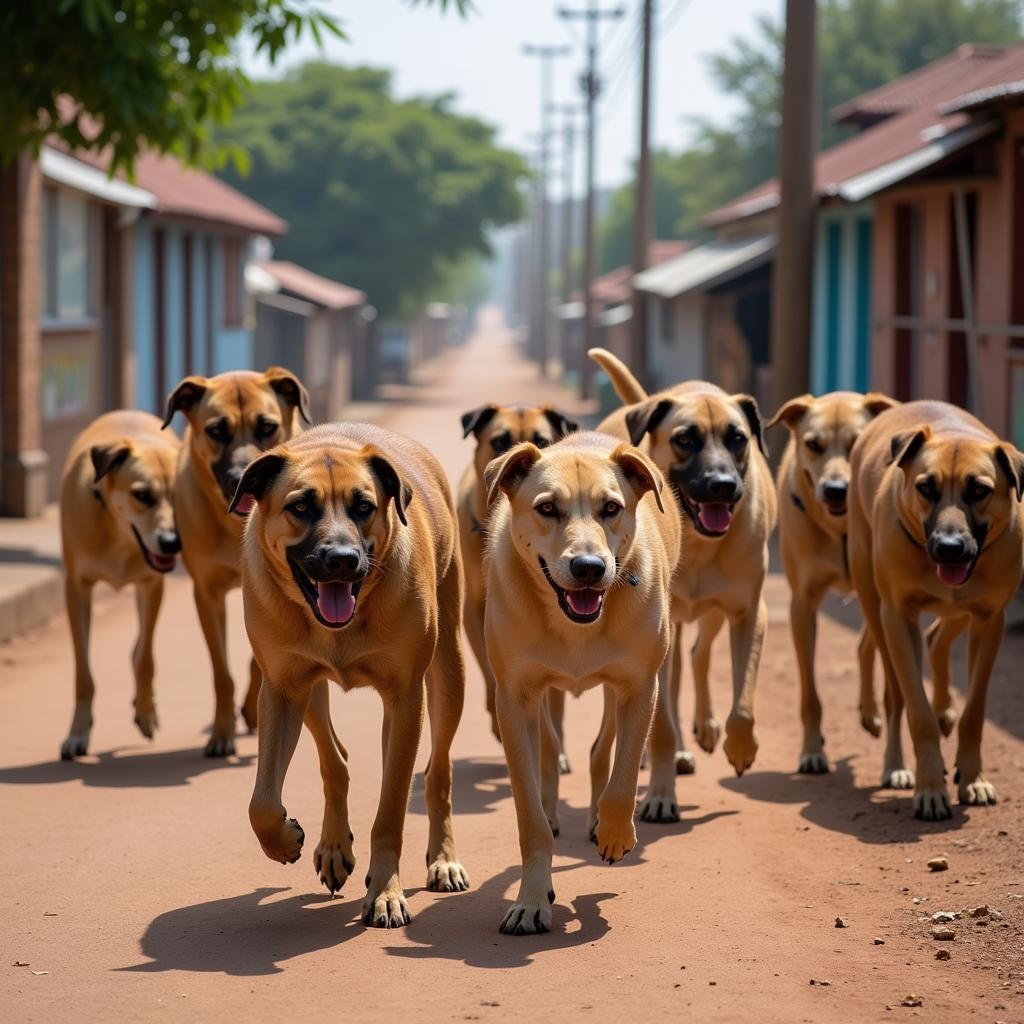Understanding African Dog Attacks
African Dog Attacks are a complex issue, often shrouded in misinformation and fear. This article delves into the realities of such incidents, exploring the contributing factors, preventative measures, and the crucial role of responsible dog ownership in mitigating risks. We’ll examine various aspects, from understanding dog behavior to promoting community safety. african attack dogs
Factors Contributing to African Dog Attacks
Several intertwined factors contribute to dog attacks in Africa. Understanding these factors is key to developing effective prevention strategies. These include stray dog populations, lack of responsible pet ownership practices, and limited access to veterinary care, including rabies vaccinations. Socioeconomic conditions also play a role, as do cultural beliefs surrounding dog ownership. For example, in some communities, dogs are primarily seen as working animals rather than companions, potentially leading to different training and socialization approaches.
 Stray Dog Pack Roaming Streets
Stray Dog Pack Roaming Streets
What contributes to these attacks? Limited access to veterinary care, particularly rabies vaccinations, is a major concern. Rabies can dramatically alter a dog’s behavior, making them more aggressive and prone to biting.
Preventing African Dog Attacks: A Multi-pronged Approach
Addressing the complex issue of dog attacks requires a multifaceted approach. Public awareness campaigns can educate communities about responsible dog ownership, including proper training and socialization. These campaigns can also emphasize the importance of rabies vaccinations. Furthermore, initiatives focused on spaying and neutering stray dogs can help control population growth and reduce the risk of attacks. Collaboration between local authorities, animal welfare organizations, and community members is essential for implementing and sustaining these efforts.
What can individuals do to protect themselves?
Individuals can take several precautions, such as avoiding approaching unfamiliar dogs, especially those exhibiting aggressive behavior. Carrying a walking stick or personal alarm can offer a sense of security. Educating children about dog safety is paramount. They should learn to never approach, touch, or tease a dog they don’t know.
The Importance of Responsible Dog Ownership
Responsible dog ownership is crucial in preventing dog attacks. This involves providing proper training, socialization, and regular veterinary care, including vaccinations. Training should focus on basic obedience and appropriate behavior around people and other animals. Socialization exposes dogs to various stimuli, helping them develop into well-adjusted companions. Secure containment, such as fenced yards or leashes, prevents dogs from roaming freely and potentially engaging in aggressive behavior. african attack dog
“Responsible dog ownership isn’t just about the well-being of the animal; it’s about the safety and well-being of the entire community,” says Dr. Abasi Okon, a veterinarian based in Nairobi, Kenya. “By ensuring our dogs are properly trained, socialized, and vaccinated, we’re taking proactive steps to prevent tragic incidents.”
Conclusion: Working Towards Safer Communities
African dog attacks are a preventable problem. By understanding the contributing factors and implementing comprehensive strategies that emphasize responsible dog ownership, community education, and accessible veterinary care, we can create safer environments for both people and animals. african jungle animals hunting This requires a collective effort, involving individuals, communities, and organizations working together towards a common goal. Addressing this issue not only protects human lives but also improves the welfare of dogs across the continent.
“Remember,” adds Dr. Okon, “a well-trained and cared for dog is less likely to become a threat. It’s about creating a culture of responsible pet ownership.”
FAQ
- What should I do if I am bitten by a dog in Africa?
- Are there specific breeds of dogs more prone to attacking in Africa?
- What role do cultural beliefs play in dog attacks?
- How can tourists protect themselves from dog attacks while visiting Africa?
- What are the signs of rabies in a dog?
- Are there any legal repercussions for dog owners whose dogs attack people in Africa?
- How can I support organizations working to prevent dog attacks in Africa? african american civil rights movement short summary
Need help? Contact us: Phone: +255768904061, Email: kaka.mag@gmail.com Or visit us: Mbarali DC Mawindi, Kangaga, Tanzania. We have a 24/7 customer service team.




